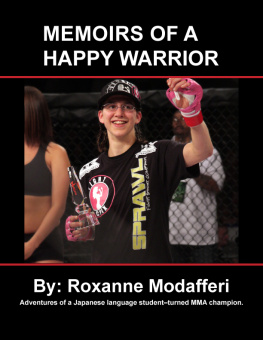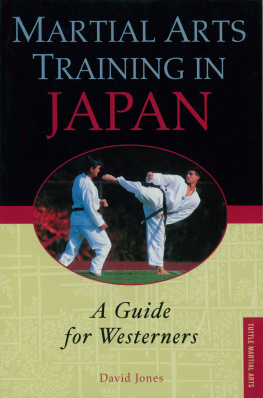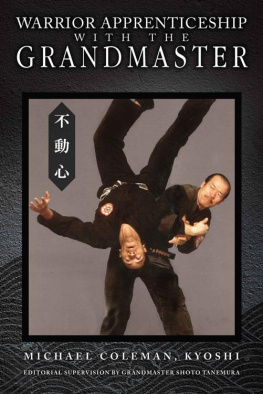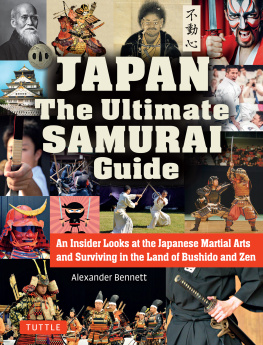No part of this publication may be reproduced, stored in a retrieval system, or transmitted in any form or by any means, electronic, mechanical, photocopying, recording, or otherwise, without written permission of the publisher. For information regarding permission, write to: Burning Horse Media, Inc.Attention: Permissions Department6512 N. Decatur Blvd Suite 130 Box #305Las Vegas, NV 89131USAwww.burninghorsemedia.com This book was originally published in paperback by Burning Horse Media in 2013. ISBN - 13: 978-0-9857361-4-9 ISBN 10: 0985736143 Copyright 2013 Roxanne Modafferi All rights reserved. Published by Burning Horse Media, Inc. Burning Horse Media, BHM, and associated logos are trademarks and/or registered trademarks of Burning Horse Media, Inc.
Printed in the USA by Allura Printing First Burning Horse Media paperback printing, October 2013 Memoirs of a Happy Warrior was written in full by Roxanne Modafferi Front and back covers designed by Sue Buenger www.suebueart.com Front cover photo Roxanne Modafferi is courtesy of Matthew Kaplowitz from www.thefightnerd.com Back cover photo of Roxanne Modafferi is courtesy of Dave Mandel from www.sherdog.comMemoirs of a HappyWarriorRoxanne ModafferiMemoirs of a Happy Warrior is an autobiographical account of professional mixed martial arts fighter Roxanne Modafferi. The book takes place over the course of two years when Roxanne decided to move from the United States to Japan for her junior year of college. After settling in with her host family and figuring out how become more Japanese, Roxanne immediately continued her martial arts training. From there, she embarked on her professional MMA career and never looked back. Roxanne toppled several tough opponents and eventually pulled off the remarkable feat of capturing the IFC middleweight championship. Memoirs of a Happy Warrior takes you, the reader, on her journey of becoming lost in Tokyo and its surrounding cities, figuring out how to use the countrys public transportation, living in the Mecca of anime and the birthplace of some of the most respected martial arts in the world.
It wasnt always easy for Roxanne, though, as she often found herself struggling to communicate with those around her as well as suffering a nasty injury during one of the most crucial times of her early MMA career. Still, Roxanne persevered and tackled some of the toughest women in Japanese MMA and held her own against them all. Memoirs of a HappyWarrior describes what it was like for someone who never, ever wanted to hurt anybody to be able to find the inner strength to inflict punishment onto her opponent and have her hand raised in victory over and over. Training and fighting is not an easy career to pursue, but Roxanne Modafferi not only embraced the challenges; she conquered them to become a legitimate world champion. Over the years, she would continue to fight and eventually landed a coveted spot on the 18th season of the wildly popular UFC-based reality TV series The Ultimate Fighter. Forward Roxanne Modafferi is the bravest fighter I know, with thepurest soul, and I know thousands.
Her unique 20-year journeyin martial arts from the earliest days of WMMA to its ferociouspeaks today has taught me invaluable, incalculable lessons inwhat it is to be a warrior, and a human being. Now you can learnthem, too. Kirik Jenness, official records keeper for mixed martial arts. Chapter 1 - The Arrival: Meet the Host FamilyWhen in Japan, do as the Japanese do.August 31, 2003 The taxicab driver turned around in his seat and said, "I'm sorry, I can't find your house." I opened my eyes and lifted my head off the doily-covered seat back. "What?" I asked. I thought I didn't have to pay attention anymore after turning myself over to the little old man, who sped us down the mysterious back streets of Musashi Koganei City. After all, he seemed so professional sitting in his spotless black suit, his taxi decorated with almost limousine-like quality.
As soon as he had finished straining himself getting my mammoth suitcases into his trunk, he'd whipped out his wrinkled map and pinpointed our destination. Or so I thought. "Mana, did he just say he doesn't know how to get to the house?" I asked the slender Japanese girl sitting next to me. "Just a minute," she said. She leaned forward and conversed with the driver, using Japanese vocabulary that went over my head. If I'd been tense, I would have cried, but jetlag and physical exhaustion made me feel like I was in another universe, not to mention all the short Japanese people walking around everywhere.
Mana would handle it. She was my guide, after all. I rolled the windows down a little lower and I leaned back again. The cool fingers of the night breeze brushed my face and neck. The International Christian University (ICU) was one of the Ivy League colleges in Japan, famous for being difficult to get into, and turning out students who could speak English. It reportedly had the highest percentage of foreign students out of all the schools in Japan.
When it came time to choose a school to do my junior year exchange at, I'd picked it off a list of choices, not really knowing it from the next school listed. Fate must have been guiding my hand, for it led me down an adventurous road to not only a wonderful education, but to a successful fighting career and securing a job after college. ICU had arranged for a student to pick me up at the airport and drop me off at my host family's house. I couldn't have gotten anyone better than Mana Ogawa. The cute 19-year old's big round smile greeted me as I trudged through the international flight doors, exhausted, with a massive amount of luggage in tow. At one point I'd been proud of the amount I managed to cram into the big black suitcase without going over the 60 pound weight limit.
Not anymore. After our introductions, it was the first thing she mentioned. "That's a lot of luggage," she had commented with a laugh, taking over dragging one of my two huge black suitcases. "Yeah, well I am moving here for a year!" I rationalized. "I want to be prepared!" "Oh!" She laughed again. Her eyes disappeared in her face because she smiled so widely.
That smile never faltered, even after three hours of navigating through the hectic Tokyo rush hour. On the long train ride from Narita International Airport to Musashi Koganei, she spoke broken English to me, and I spoke broken Japanese right back to her. We passed fields of crops with rice and other vegetables, traditional looking houses, manufacturing plants, commercial buildings, and other things I couldn't recognize. Up until then, I had virtually no Japanese speaking practice in the US other than what I did to study for dreaded speaking tests. My heart raced every time I produced a sentence. "I'm speaking Japanese, I'm speaking Japanese!" cycled through my head like a cheer.
It was my dream to be fluent in two languages. Before I'd studied Japanese, it seemed almost incomprehensible to me that two sets of words unrelated to each other could make sense and function in someone's mind. "Don't worry about speaking practice now," said Martin Holman sensei, my Japanese teacher at the University of Massachusetts (UMass). As third year students, my class had been complaining about not practicing enough in class. I remember the tall man sitting on the desk in the front, wearing his usual brown suit and tie, swinging his legs. "When you're in Japan, you'll get more speaking practice in a week than you can get here in a year, he said, and just kept on with the grammar lessons. "When you're in Japan, you'll get more speaking practice in a week than you can get here in a year, he said, and just kept on with the grammar lessons.
Next page











